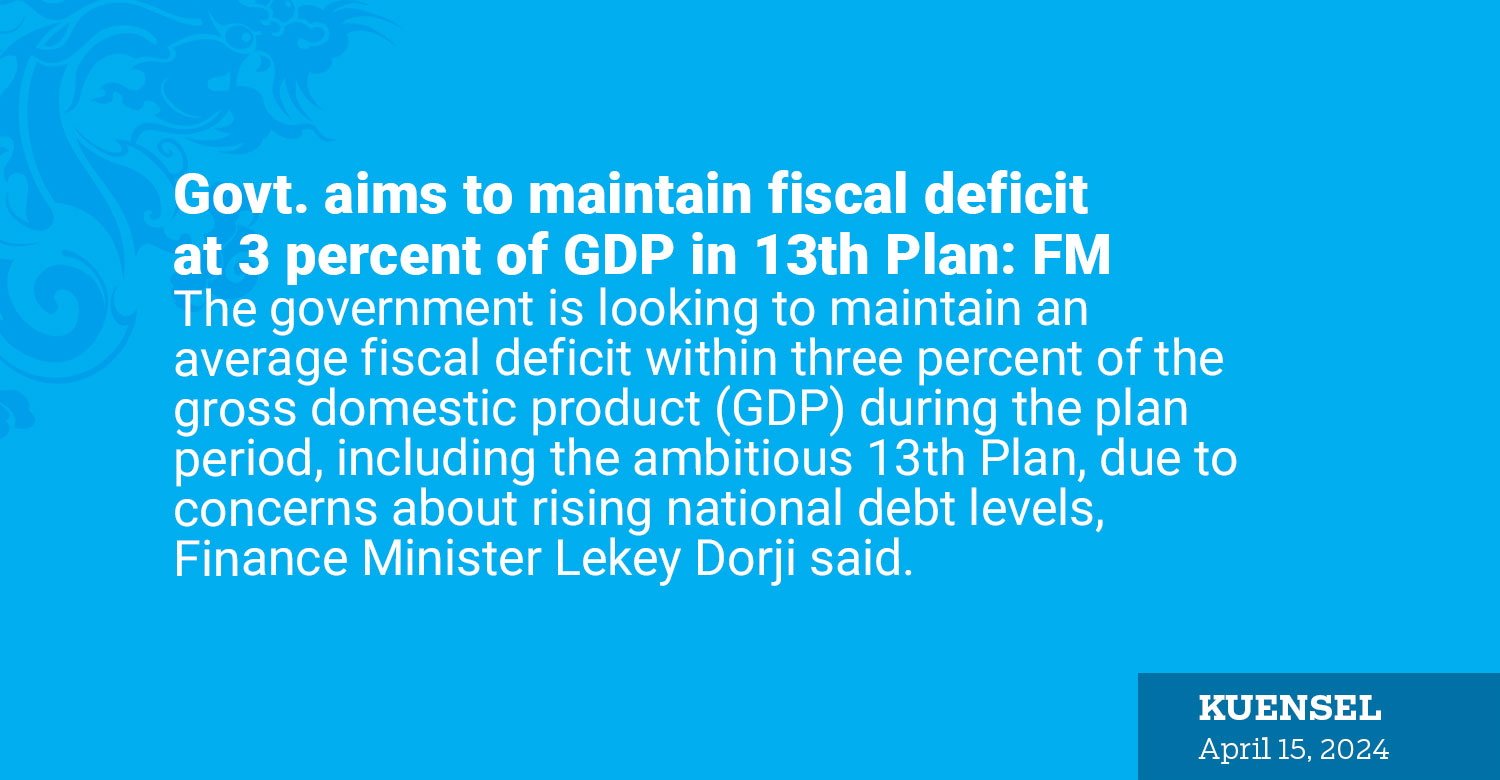
…to cut down all unnecessary expenditures
The government is looking to maintain an average fiscal deficit within three percent of the gross domestic product (GDP) during the plan period, including the ambitious 13th Plan, due to concerns about rising national debt levels, Finance Minister Lekey Dorji said.
The government, he said, would take a consistent and predictable economic and fiscal policy to ensure growth and financial stability to achieve the high-income Gross National Happiness economy by the end of 2024.
“The government will ensure that borrowings are invested in the right areas that give the country good social and economic returns. Besides, the government will pursue fiscal consolidations at the same time,” minister said.
This means that the government must improve the efficiency and effectiveness of spending and cut down unnecessary or wasteful expenditures.
For the 13th Plan, the fiscal deficit is expected to be at three percent of GDP or Nu 40.6 billion with total resources estimated at Nu 363.91 billion against expenditures of Nu 404.51 billion.
The government will cover the financing gap through borrowing from both external and domestic sources.
Bhutan’s debt had risen to Nu 279.93 billion, constituting 103.2 percent of the GDP as of December last year. This comprises Nu 251.83 billion in external debt and Nu 28.1 billion in domestic debt.
The debt is further projected to reach Nu 306.13 billion equivalent to 120.51 percent of the GDP in this fiscal year 2023-24, according to the finance ministry. For the fiscal year, the fiscal deficit is projected at Nu 15.55 billion which is 5.83 percent of the GDP.
The government always pursued caution while contracting external debt, the minister said, adding that the external financing has been sought in the form of grants and where grants are not forthcoming, highly concessionary loans were availed from multilateral and bilateral development partners to carry out the socioeconomic projects.
He added that the loans at commercial terms were contracted only for commercially viable projects mostly in the hydropower sector, which are self-liquidating.
For a resource-constrained economy like Bhutan, Lyonpo said that prudent borrowing for investment was crucial to promote socioeconomic growth in the country.
He added, however, that the public officials as custodians and as part of our fiduciary duties, must ensure that these borrowed funds are channeled in the right areas in order to yield returns for the country now and for our future generations later.
He also said that the public must have confidence in the good governance process as far as public financial management is concerned where the Constitution prohibits the government from borrowing to spend on day-to-day recurrent expenses, only capital investment funds are allowed to be borrowed—external or internal.
Finance ministry is implementing fiscal and budgetary reforms rigorously to enhance resource mobilisation and fiscal consolidation.
Minister said that the ministry was putting in efforts to mobilise green and climate financing capitalising on Bhutan’s track record in conservation of the environment.
As part of the fiscal consolidation, he said that the ministry was rolling out fiscal consolidation where all the programmes and activities proposed by the budgetary agencies are assessed to see if they are economically viable and contribute to long-term growth.
Bhutan’s external debt dynamics remain to be at a moderate risk of debt distress as concluded by the joint International Monetary Fund and the World Bank Debt Sustainability Analysis 2022.
At the same time, the finance ministry’s in-house Debt Sustainability Analysis, carried out from fiscal year 2021-22 on an annual basis, concluded that Bhutan’s debt remains at a moderate debt distress.
Minister said that the assessment was based on the commercial viability of the hydropower projects with special treatment of the same category of foreign direct investments, projects implemented under the inter-governmental model, Bhutan’s strong track record of project implementation, rapid growth in energy demand from India, committed donor support among others.












